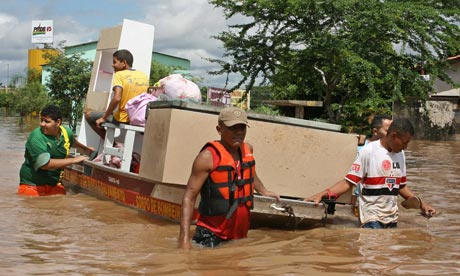Brazil: Recriminations have begun
by Sue Branford 14 January 2011
 Even though natural disasters, such as mudslides and floods, have occurred with depressing frequency in Brazil, the response of the local media has been muted. It has often seemed shocking that disasters that have killed 10, 20 or even more people have been so poorly reported.
Even though natural disasters, such as mudslides and floods, have occurred with depressing frequency in Brazil, the response of the local media has been muted. It has often seemed shocking that disasters that have killed 10, 20 or even more people have been so poorly reported.
But this time it is different: the story is dominating the national agenda. There are several reasons for this. The scale of the tragedy is unprecedented, with some officials already predicting at least 1,000 deaths. The disaster is particularly horrific, as it is virtually impossible for anyone to survive in the swirling, muddy waters. Ricardo dos Santos Loureiro, a colonel in the fire brigade who was part of the rescue effort after Haiti’s earthquake a year ago, told the Folha de S. Paulo newspaper that conditions were even worse than in Haiti. “We’re working in dark. We can’t see the structure of the buildings. Even though the disaster was on a huge scale in Haiti, at least we could see the structures.” And the local press has realised that the disaster has become an international news story, with all the leading Brazilian newspapers quoting from reports in the foreign press.
The concentrated media attention on the disaster is leading journalists to ask the obvious (but none the less important) question: why is our death toll so much higher than in Australia? A much larger area was flooded in Queensland, yet only 13 deaths have, so far, been reported. BBC Brasil, which is the website run by the BBC’s Brazilian Service, put this question to Margareta Wahlström, the UN’s Assistant Secretary-General for Disaster Risk Reduction. She said: “Brazil could have avoided deaths if it had had efficient emergency plans. She cited Indonesia, which “although it is a poor nation, has evacuation plans for threats like an earthquake or a volcanic eruption.” “These are initiatives that save lives”, she said. Wahlström, who has more than 25 years’ experience in disaster management, went on: “A lot needs to be done in Brazil in terms of urban planning. Governments have to work with the population and really forbid buildings in risk areas. The country has a lot of regulations; the problem is that they are not always respected.”
 This is perhaps something of an understatement. Several Brazilian newspapers are scathing about the scant priority given to disaster prevention by the Brazilian authorities. They report that, after floods and mudslides in the past, members of Congress have presented Bills to Congress for prevention work, particularly the relocation of families living in areas of high risk. But nothing has happened: there are 30 such Bills gathering dust in drawers in Congress.
This is perhaps something of an understatement. Several Brazilian newspapers are scathing about the scant priority given to disaster prevention by the Brazilian authorities. They report that, after floods and mudslides in the past, members of Congress have presented Bills to Congress for prevention work, particularly the relocation of families living in areas of high risk. But nothing has happened: there are 30 such Bills gathering dust in drawers in Congress.
In its main editorial, the Folha de S. Paulo says that politicians are largely to blame. “For political reasons the authorities all over the country aren’t prepared to pay the price of removing inhabitants from high-risk areas. Very often they have encouraged the occupation of these areas, creating electoral strongholds on lands doomed to disaster. They have ignored building regulations, they have disregarded norms about the conservation of vegetation along river banks, and they have shown no interest in the capacity of the land to handle heavy rains.”
Will this change under Brazil’s first woman president, who took office at the beginning of this month? Dilma Rousseff is being widely praised for her prompt response. She rapidly declared a state of emergency. She travelled immediately to Rio de Janeiro, and flew by helicopter over the affected areas, putting on galoshes and a life jacket to walk in the streets, to listen to the people and to show them that the state was responding to the disaster. The Rio de Janeiro state governor and seven ministers accompanied her, and she met the mayors of the affected municipal districts. Two big challenges face her: to act effectively in the short term and to make sure that the authorities finally carry out the long-term planning that will prevent tragedies on this scale in the future. Unless this happens, these disasters will recur.

